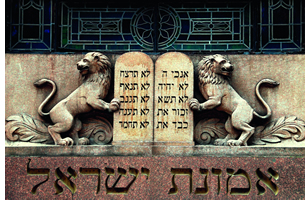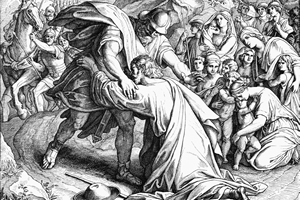Why Israel? Part 1
Have you ever wondered why tiny little Israel, of all places, occupies so much space in the media? A biblical look behind the scenes.
It’s believed that the philosopher Hegel once said, “My philosophy explains everything except the Jews.” Why? Because the Jewish people have a unique place in God’s plans and purposes. Israel’s fate is foretold in the Bible with divine accuracy, and the history and existence of this people confirm the reliability of biblical prophecy.
It All Started with Sin
In Genesis 3, the Bible describes the fall of man. God created man in His image and endowed him with free will, because He wanted to have a counterpart. Adam and Eve could decide for themselves whether they would do the will of their Creator. The devil managed to undermine God’s word, causing Eve to begin to doubt. The tragic consequence was that she violated God’s will and chose to disobey her Creator. This fulfilled the first prophetic word in the Bible: death entered in, both physical and spiritual. The latter means that man will be separated from God forever because of his sin.
In His love, though, God wanted to create a way out. This required a solution that satisfied both His holy righteousness and His love. God chose to take man’s guilt upon Himself in order to be able to forgive. But since the eternal God Himself couldn’t die, He became human in Jesus Christ. And in Jesus Christ, He accomplished the work of redemption.
Shortly after the fall of man, the Almighty makes the first prophetic promise of salvation by declaring war on Satan: “And
I will put enmity between thee and the woman, and between thy seed and her seed; it shall bruise thy head, and thou shalt bruise his heel” (Gen 3:15). This statement is comprised of three truths…
1. The division of human lineage. From that moment on, there will be one line that can be influenced by Satan and doesn’t believe God. And there will be a second that will answer God’s call.
2. These two lines are hostile to each other, because one is allowing itself to be led by the devil, and the other by God.
3. Someday, a Person will emerge from the descendants of the woman who will defeat Satan, sin, and death. This descendant will crush Satan’s head, and Satan will strike His heel.
Not long after the fall of man, the line of humanity that left God to go its own way is clear: it begins with Cain, who slew his brother Abel to become the first murderer.
God Chooses Abraham
The human line that seeks and obeys God begins with Seth, the son who was born to Adam and Eve in Abel’s place. We find this line in Jesus’ earthly family tree.
 The eternal God in Jesus Christ, intended to come from heaven to earth and enter human history. So He would need a people, a nation, and a specific birthplace. With this in mind, God chose Abraham, who came from Ur in Chaldea (Babylonia). The Almighty could have called someone else, but His sovereign choice was Abraham. Regarding his appointing, the Bible says, “Now the Lord said unto Abram, Get thee out of thy country, and from thy kindred, and from thy father’s house, unto a land that I will show thee: And I will make of thee a great nation, and I will bless thee, and make thy name great; and thou shalt be a blessing: And I will bless them that bless thee, and curse him that curseth thee: and in thee shall all families of the earth be blessed” (Gen 12:1-3). This divine election involves three basic elements:
The eternal God in Jesus Christ, intended to come from heaven to earth and enter human history. So He would need a people, a nation, and a specific birthplace. With this in mind, God chose Abraham, who came from Ur in Chaldea (Babylonia). The Almighty could have called someone else, but His sovereign choice was Abraham. Regarding his appointing, the Bible says, “Now the Lord said unto Abram, Get thee out of thy country, and from thy kindred, and from thy father’s house, unto a land that I will show thee: And I will make of thee a great nation, and I will bless thee, and make thy name great; and thou shalt be a blessing: And I will bless them that bless thee, and curse him that curseth thee: and in thee shall all families of the earth be blessed” (Gen 12:1-3). This divine election involves three basic elements:
1. Abraham would receive land.
2. Abraham would become a nation.
3. All the generations of the earth would be blessed by Abraham’s descendants.
This blessing is a reference to Jesus Christ, the Savior of the world. He would be one of Abraham’s descendants, born in Israel. Abraham was the first to be called a “Hebrew” (Gen 14:13). God had a single goal for calling Abraham: the promise of land, and later with Jerusalem and the Jewish nation: to send Jesus into the world.
God fulfilled His promise to His friend (as He also called Abraham; cf. James 2:23) by giving him the Promised Land. But the promised seed seemed to be missing, as Abraham remained childless for decades. When a son was finally born to him and his wife Sarah, God asked Abraham to sacrifice this sole, beloved son. We can only understand this from the perspective of the New Testament. Mount Moriah, where Abraham was supposed to sacrifice his son Isaac, later became Calvary, where Jesus died for us. Abraham didn’t have to sacrifice his son in the end, whereas God Himself gave up His only, dearly-beloved Son for lost humanity. The promised blessing had come. But Jesus didn’t remain dead; He rose from the dead and lives eternally!
 Jacob Becomes Israel
Jacob Becomes Israel
When Isaac, son of Abraham, became a man, he married and had twin sons with his wife, Rebekah. One was named Esau, and the other Jacob. Jacob turned out to be quite cunning. He found it easy to cheat others, even his own father. However, numerous difficulties, hardships, and life crises led him to urgently call on the Lord. And God made Himself known. If his grandfather Abraham had been the first Hebrew, Jacob became the first Israelite. Why did God choose Jacob/Israel, a former deceiver? There is only one answer to this question. God begins with the statement: “I am the LORD God of Abraham thy father, and the God of Isaac: the land whereon thou liest, to thee will I give it, and to thy seed; And thy seed shall be as the dust of the earth, and thou shalt spread abroad to the west, and to the east, and to the north, and to the south: and in thee and in thy seed shall all the families of the earth be blessed. And, behold, I am with thee, and will keep thee in all places whither thou goest, and will bring thee again into this land; for I will not leave thee, until I have done that which I have spoken to thee of” (Gen 28:13-15).
In a manner of speaking, God’s promise to Jacob is a repetition of the most important promise in redemptive history: the one made to Abraham. All generations on earth would be blessed through him. Almost 2,000 years after this statement was made, the Israelite Jesus of Nazareth uttered the famous words on the Cross at Calvary: “It is finished” (John 19:30). Redemption for all generations on earth had become fact.
The Twelve Tribes of Israel
Jacob fathered twelve sons, the ancestors of the twelve tribes of Israel. Of these twelve tribes, Judah in particular stood out. Israel’s Messiah, Jesus Christ, was to come from this tribe in the future. God announced this about 19 centuries before Jesus’ actual coming: “The sceptre shall not depart from Judah, nor a lawgiver from between his feet, until Shiloh come; and unto him shall the gathering of the people be” (Gen 49:10). The word “Shiloh” means “hero” and refers to the Messiah. In fact, the tribe of Judah was constantly a leader in Israel. Judah led the way in the exodus through the desert (Num 10:14). The tribe of Judah was the largest in the census conducted by Moses (Num 26:22). The most eminent kings of Israel, David and Solomon, came from Judah. The Jewish temple was in Judah. And the royal dynasty of Judah reached all the way to the highest of all kings, the Messiah of Israel and Christ of the world: “For it is evident that our Lord sprang out of Juda…” (Heb 7:14). The twelve tribes of Israel came to Egypt through Joseph, the second youngest son of Jacob. They lived there for several centuries as foreigners, and grew from an initial 70 people to roughly two million (cf. Deut 10:22). But they were viciously oppressed by the Egyptians as slaves. So they cried out to God, and God chose Moses and his brother, Aaron. These two would lead the Israelites out of Egypt and back to the land that He had promised Abraham, Isaac, and Jacob—because later, Jesus was to be born into the world in the Promised Land. With an eye to Jesus, Moses said prophetically: “The LORD thy God will raise up unto thee a Prophet from the midst of thee, of thy brethren, like unto me; unto him ye shall hearken” (Deut 18:15).
Many centuries later, Jesus and His disciples referenced Old Testament statements like the one just quoted (John 1:45). Shortly after His crucifixion and resurrection from the dead, Jesus said to His disciples, “Ought not Christ to have suffered these things, and to enter into his glory?” Then Scripture says, “And beginning at Moses and all the prophets, he expounded unto them in all the scriptures the things concerning himself” (Luke 24:26-27).
Who Is the “Star Out of Jacob”?
During the long period of wandering in the desert between Egypt and the Promised Land, there were repeated confrontations with enemies seeking to destroy Israel. But each time, God held His protective hand over the people. His reason is strongly expressed in an incident recorded in Numbers 22—24: The Moabite king Balak wanted to curse Israel, so he hired a fortune teller named Balaam. But God redirected Balaam’s heart so that he couldn’t practice occult fortune-telling, but instead had to utter a divine prophecy. It sounded like this: “I shall see him, but not now: I shall behold him, but not nigh: there shall come a Star out of Jacob, and a Sceptre shall rise out of Israel…” (Num 24:17).
Who is meant by the star, and what is the scepter? About 1,400 years later, Jesus was born in Bethlehem. To mark the event, the now-famous “Star of Bethlehem” appeared in the sky! Moreover, it also points to the “bright and morning star.” The scepter is an indication of Jesus’ future kingship. He will return and rule over the whole world. “And he hath on his vesture and on his thigh a name written, KING OF KINGS, AND LORD OF LORDS” (Rev 19:16). Jesus Christ Himself says on the last page of the Bible, “I Jesus have sent mine angel to testify unto you these things in the churches. I am the root and the offspring of David, and the bright and morning star…He which testifieth these things saith, Surely I come quickly. Amen. Even so, come, Lord Jesus” (Rev 22:16, 20).
Israel could never have been destroyed in the past, because the Messiah, Jesus Christ, was to come into the world through this people, as a star out of Jacob. Nor will Israel be eradicated today or in the future, because the Lord intends to (and will) return to His people and land.
The prophet Isaiah, who worked mainly in Jerusalem and its surroundings, lived in the 7th century BC. God assigned him to make many future-oriented announcements on His behalf. The best-known are found in Isaiah 53. A prophecy of this kind, whose fulfillment went down in world history, is unprecedented.
At about the same time as Isaiah, another prophet was living and working around Judea. Through this prophet, Micah, God announced Jesus’ birth in Bethlehem (Micah 5:2). Additionally, there are about 300 Old Testament prophecies related to Jesus’ first coming, and all of them were literally fulfilled in Christ.
 Prophecy Is Fulfilled
Prophecy Is Fulfilled
When Jesus came, He was rejected by Israel’s leaders. This led to Him being crucified. Just before His death, the Lord prophesied about Jerusalem: “O Jerusalem, Jerusalem, thou that killest the prophets, and stonest them which are sent unto thee, how often would I have gathered thy children together, even as a hen gathereth her chickens under her wings, and ye would not! Behold, your house is left unto you desolate. For I say unto you, Ye shall not see me henceforth, till ye shall say, Blessed is he that cometh in the name of the Lord” (Matt 23:37-39).
Jesus also announced in other places that Jerusalem would again be conquered by a foreign power, the temple would be destroyed, and the people would be scattered—but this time into the entire world (Luke 21:5-7, 20-24). These words were fulfilled in AD 70. The Romans destroyed Jerusalem, burned the temple, and brought countless Jews into captivity among the Gentiles.
The Apostle Paul writes to the Roman church that Israel’s existence and history aren’t just about Israel itself, but about God’s mission of salvation for the nations through Jesus Christ: “For of him, and through him, and to him, are all things: to whom be glory for ever. Amen” (Rom 11:36). “To him give all the prophets witness, that through his name whosoever believeth in him shall receive remission of sins” (Acts 10:43).
News from Israel - 04/2021


